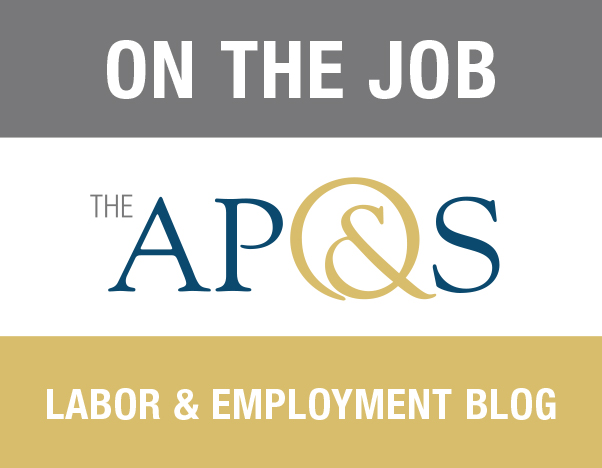Effective October 1, 2018, employers in Massachusetts, Rhode Island, and other states seeking to hold Massachusetts employees to non-compete agreements must meet the requirements of a new law passed by the Massachusetts Legislature entitled, “An Act Relative to Judicial Enforcement of Non-Competition Agreements.” The fruits of at least a decade of negotiations to produce a bill that could pass both the Senate and the House, the new law attempts to balance reasonable contractual restrictions in restraint of trade against the policy against monopolies. It limits enforceability of non-compete agreements, codifies the contractual terms required to render agreements enforceable, and applies not only to an employer’s agreements with employees but also to agreements with independent contractors.[1]
Under the new Massachusetts statute, a noncompete agreement must be in writing, signed by both parties (which may seem obvious but has not been required in all cases enforcing noncompete agreements), and state explicitly that an employee has the right to consult counsel before signing the agreement. The employer must also provide prior notice of the agreement. If the non-compete is to be signed at the start of employment, then the employer must provide notice to the job applicant before making a formal offer of employment or ten (10) days before the applicant starts work, whichever happens first. If the employee is already working for the employer when the noncompete agreement is presented, then the employer must give the employee ten (10) days’ notice before the agreement becomes effective.
The Massachusetts statute requires that a noncompete agreement be supported by independent consideration, thereby ending the debate over whether continued employment will suffice.
Massachusetts has now codified the time, geography and activity restrictions that will be enforceable under the terms of a non-compete agreement. The non-compete may only restrain the employee from competing for one (1) year post-employment unless the employee has breached a fiduciary duty to the employer or has unlawfully taken – either “physically or electronically” – property belonging to the employer. In these circumstances, the restricted period can continue for up to two (2) years.
As for restraints on geographic area and activity, a non-compete may ban the restrained party from working only in geographic areas in which the employee provided services or had a “material presence or influence within the last two years of employment.” The activities that may be restrained are limited to only those types of services that the employee provided during the last two years of employment. If these geographic and activity limits are heeded in the agreement, then the limitations will be deemed “presumptively reasonable” if tested in a court of law.
The new law also makes clear that a non-compete will not be enforced unless enforcement is necessary to protect trade secrets (defined by reference to the new Massachusetts Trade Secrets Act), confidential information (which may be information that does not qualify as protected under the Trade Secrets Act), and employer goodwill. The agreement must be no broader than necessary to protect one or more of these legitimate business interests.
Massachusetts has now deemed non-competes unenforceable against several groups of workers, including employees classified as non-exempt from overtime requirements under the Fair Labor Standards Act; undergraduate and graduate students participating in internships or other short-term employment; employees terminated without cause or laid off; and employees 18 years of age or younger.
Saving the most novel – and likely most controversial – feature of the new law for last, Massachusetts has put itself in the national spotlight and taken a bold step in the direction of discouraging noncompetes by requiring that the employer pay “garden leave” for the duration of the non-compete period.[2] The law requires that the garden leave clause “or other mutually agreed upon consideration” be explicitly set forth in the agreement, and that the garden leave equal at least fifty (50%) percent of the employee’s highest salary within the last two (2) years of employment. (Note that the alternative to garden leave of “other mutually agreed upon consideration,” may arguably need to be at least equivalent to the fifty (50%) percent of salary that defines garden leave in the law.) An employer is relieved from paying garden leave only if the employee breaches the agreement or the noncompete is deemed unenforceable because the employer terminated the worker without cause or laid off the worker. In the statutory definition of “garden leave clause,” the law seems to allow the employer to waive the post-employment restrictions, but absent a waiver and absent factors rendering the noncompete terms unenforceable, the employer may not unilaterally discontinue payments. In other words, if the employer wishes to enforce the restrictive covenants in the post-employment period, then the employer must pay while the worker remains restricted in accepting new employment.
The new Massachusetts law provides that an action to enforce a non-compete agreement must be brought in the county where the employee resides or, if the parties agree, then in Suffolk County Superior Court, where the dispute will be assigned to the Business Calendar. (Enforceability of a Suffolk County venue agreement is already being questioned as impermissibly restricting access to the federal courts and to arbitration.) If an action is brought on a non-compete agreement, the law places in the court’s proverbial hand a “blue pencil” to rewrite the agreement to the extent necessary to make it valid and enforceable in the court’s discretion.
Finally, employers nationwide should take note that the new Massachusetts statute applies not just to Massachusetts employers but to employers in other states who have employees who are either residents of, and/or employed in, the Commonwealth.
The new Massachusetts noncompete law is as yet untested, but the matter of the employer’s obligation to pay garden leave during the post-employment restricted period will likely give rise to litigation challenging garden leave as a “windfall” in certain circumstances, such as when the employee quickly lands a better-paying position but is not in breach of the non-compete agreement. The new law is also likely to prompt employers to rethink the advisability of using noncompetes at all, and to approach the drafting of essential noncompetes so as to minimize the circumstances triggering potentially expensive and protracted payment obligations.
[1] Coincidentally, two days after the Massachusetts noncompete statute was passed, the U.S. Supreme Court rendered a decision defining the term “employees,” as used in the Federal Arbitration Act, as including independent contractors. New Prime v. Oliveira, 139 S. Ct. 532 (October 3, 2018).
[2] “Garden leave” or “gardening leave” describes a practice commonly encountered in banking and other financial employment in Britain, Australia and New Zealand. It has traditionally described the practice whereby an employee leaves a job – having resigned or otherwise had employment relationship terminated – and is instructed to stay away from work during the notice period, while still remaining on the payroll. Massachusetts has become the first state to incorporate the concept of “garden leave” into its noncompete statute.





